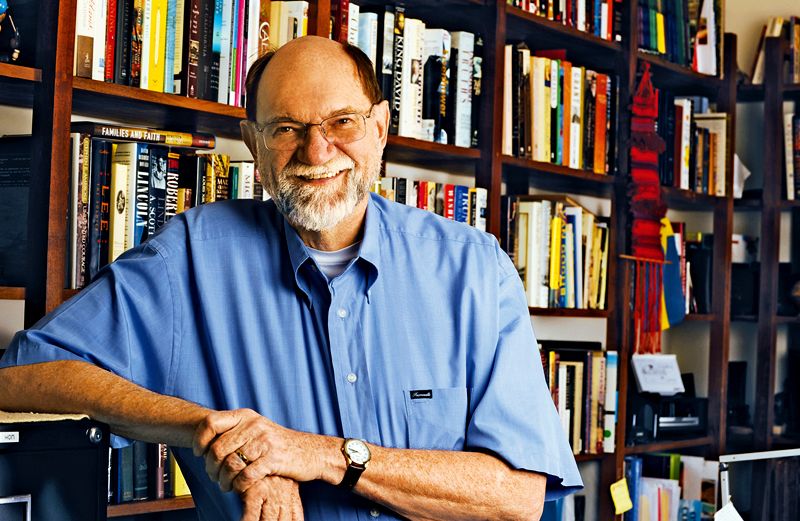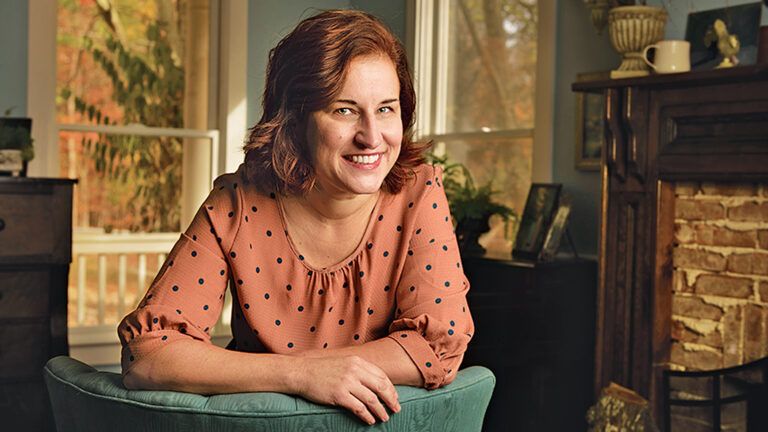I am a believer–in God, and in scientific data. I’ve studied religion from the inside as a person of faith and from the outside as a social scientist.
This may seem paradoxical to some people. To me it’s been a journey of discovery, about my own faith and about how faith is passed from one generation to the next. I’ve been surprised at the way my own faith journey has been borne out by the very research I’ve done.
For 35 years, my research team and I have interviewed thousands of people from different generations in a study of families and health that included questions about religion.
What I’ve learned is this: Even with all the societal pressures families face today, when warm and loving parents practice faith, most often their children will follow them in faith.
Maybe not exactly in the same way and not without periods of questioning, but the data from our study are clear: A warm, faith-based home most often produces faith-based children.
Parents Set the Foundation
It’s easy to get the impression that young people don’t listen to their parents, especially on matters of religion. But people were saying that same thing generations ago. It wasn’t particularly true then, and our data show it’s not true now.
My research indicates that children who grow up in what they experience as close, loving relationships with their parents are nearly twice as likely to share their parents’ religious beliefs as those who say their parents were distant and unaffectionate.
Another researcher, Scott Myers, a sociology professor at Montana State University, analyzed the results of numerous nationwide studies and concluded that “parents’ religiosity is the primary influence on the religiosity of their adult offspring.” Not by dictating faith practices but by setting a consistent example.
My own experience is a case in point. I was born into a very religious family. As far back as the 1600s, the men in my family were church leaders. My dad was an Evangelical Covenant Church pastor. I was an only child, and it was assumed that I would be called to be a minister too when I grew up.
Every Sunday I sat in the church listening to my father preach about how God is always with us, always guiding us, telling us what his will is for us. At home my dad would ask for God’s guidance in everything, the smallest decision in his life, praying aloud, his head bowed.
“God speaks to us every day,” he told me. “You just have to listen.”
My parents encouraged me in everything I did. I excelled in school, especially science. And in music. When I was old enough I joined the church choir. All those voices joined as one, the organ soaring, the poetry in the words, it all filled me with joy. That was what I looked forward to most about church.
But guess what? God never spoke to me, not once, certainly not the way he conversed with my father. So how could I be a preacher, as my parents wished? I prayed. But as far as I could tell, no one out there was listening.
I could see the hurt in my parents’ eyes when I told them I wanted to go into science, not ministry. But I did please them by going to our church college, North Park University in Chicago. There I found some amazing classes that opened my eyes to the variety of religious experiences.
Then I was off to doctoral studies at the University of Chicago, where I met students and faculty who said, “God is dead,” and who felt modern society had outgrown religion. It was the 1960s, and nothing was sacred. This new generation, my generation, seemed to want to tear everything down.
Where was all of this coming from? What role had their parents played in shaping these students’ values? The upheaval of the time stimulated my curiosity as a scientist. I would spend the rest of my life seeking data to answer questions like these, both personally and professionally.
I joined the gerontology faculty at the University of Southern California. My wife and I began attending a church quite different from the faith I grew up in. I wasn’t sure what I believed anymore, and this was also true of many young adults I was interviewing in my research.
But with two children of my own I thought it was important that we go to church–and I loved the music. Then tragedy hit: My beautiful young wife died of leukemia. Our daughters were only seven and four. Where was God? Where was that voice I needed to hear now more than ever?
All around me the world seemed dark, lonely, unforgiving and joyless. Where could I possibly turn?
Faith of Our Fathers
Mothers, of course, play a crucial role in their children’s religious upbringing, but in my research I found that fathers are often the key. Children raised by loving, affectionate, affirming fathers are twice as likely to follow their parents in faith as are children with distant, authoritarian fathers. Our data are clear on this.
My father’s work as a pastor kept him busy. I often wished he had more time to spend with me, but I never doubted his love. He was a warm, cuddly guy. Unfortunately he died before I reached full adulthood. Still, I see his influence alive in much of my life today.
I learned from his organizational and management skills as a pastor, from his passion for people and his ability to bring out the best in them. “Always do your best,” he would tell me. “God gives us gifts, but how we use them is up to us.”
He taught my eighth-grade confirmation class. I sometimes found his answers to my continual and probably annoying questions less than satisfying, but I could see he respected me for posing those questions. He never put me down for doubting.
He had served as a chaplain in World War II and ministered to soldiers of many faiths. Had he lived longer I’m sure he would have helped me with what I was struggling to understand, that God speaks to different people in different ways.
In those dark years following my wife’s death, the faith foundation my father laid down early in my life was there beneath me, even if I couldn’t feel it.
The Power of Grandparents
My widowed mother came to live with us for a time after my wife died. She was there when the girls came home from school every day. She helped with their homework and made them snacks.
And at night, after their baths, she tucked them in their beds and read them Bible stories. Noah and the ark. Daniel in the lions’ den. And, of course, Jesus. His birth. The miracles. His death and Resurrection. The same stories she had told me when I was a boy.
But my mother and I couldn’t talk about religion. I was grateful for her help and didn’t want to argue with her–I was too consumed with arguing about these things within myself.
My mom’s conservative faith was the cornerstone of her life. My decision to leave the church she and Dad had raised me in had created a gulf between us. I couldn’t tell her the questions I wrestled with.
She was scared, like some of the parents in my research, who are frightened that if their son rejects their religion, it means he rejects them too.
Even as we struggled, though, my mother taught her granddaughters about her faith. And this has had lasting consequences. My daughter Julie is reading her son Tyler Bible stories from the same book her grandmother read to her. A priceless gift.
My experience is far from unique. Especially today, with grandparents living longer and taking on more childcare responsibilities, my research found that this older generation continues to have a significant influence when it comes to shaping values and beliefs.
More than 40 percent of the grandchildren in our study shared the same religious affiliation as their grandparents, nearly the same percentage as in 1970. Faith is a spiritual legacy passed from one generation to the next. The data are clear on this too.
Prodigals and Their Return
By my sixties I had turned my back on church even as my long-term study of families, including religion, went on. By then my children were grown. I’d remarried, to a woman who was an agnostic from a fundamentalist childhood. No chance God would speak to me now!
What I didn’t see, what I couldn’t have expected, was the possibility of a connection between my research findings and my own life.
It was 2009, a Sunday in Santa Barbara. I woke up early and was reading the paper when I realized it was Easter. I thought of how that week I’d driven by a beautiful church building on State Street. It had been, what, a decade since I’d been inside a church?
But now, all I knew was I had a sudden and overpowering need to get up and go to this particular place.
“I’m going to church,” I told my wife, putting down the paper. She looked at me as if I’d said I was going to Mars.
The service was just starting. I slipped sheepishly into the only space available, at the very back. The choir was singing, their voices majestic; the organ was like thunder; trumpets were blasting. Those sounds, a clarion call. The voice–no, voices–of God. There was no mistaking them.
All those years I’d spent as a boy listening to my father preach, my mother beside me, those beautiful hymns…. A connection hundreds of years in the making.
This was where I belonged. I finally understood what my father meant: We hear God by feeling him, and I felt him now in the deepest reaches of my soul.
Today I sing every week in that choir, at Trinity Episcopal Church in Santa Barbara. I’m there for the Bible study Wednesday at noon. Monday night is my theology study group, Education for Ministry. I’ve been on the vestry, the church’s governing body.
I’m 73 now and still I wonder what my parents would think. I never got a chance to tell them how grateful I am for what they tried to teach me. But I like to think they’d be pleased with how I turned out. Similar to how the data my own lifelong research would have predicted.
I suppose that’s a kind of miracle, but the kind that happens frequently, one generation after another.
Download your FREE ebook, The Power of Hope: 7 Inspirational Stories of People Rediscovering Faith, Hope and Love.





